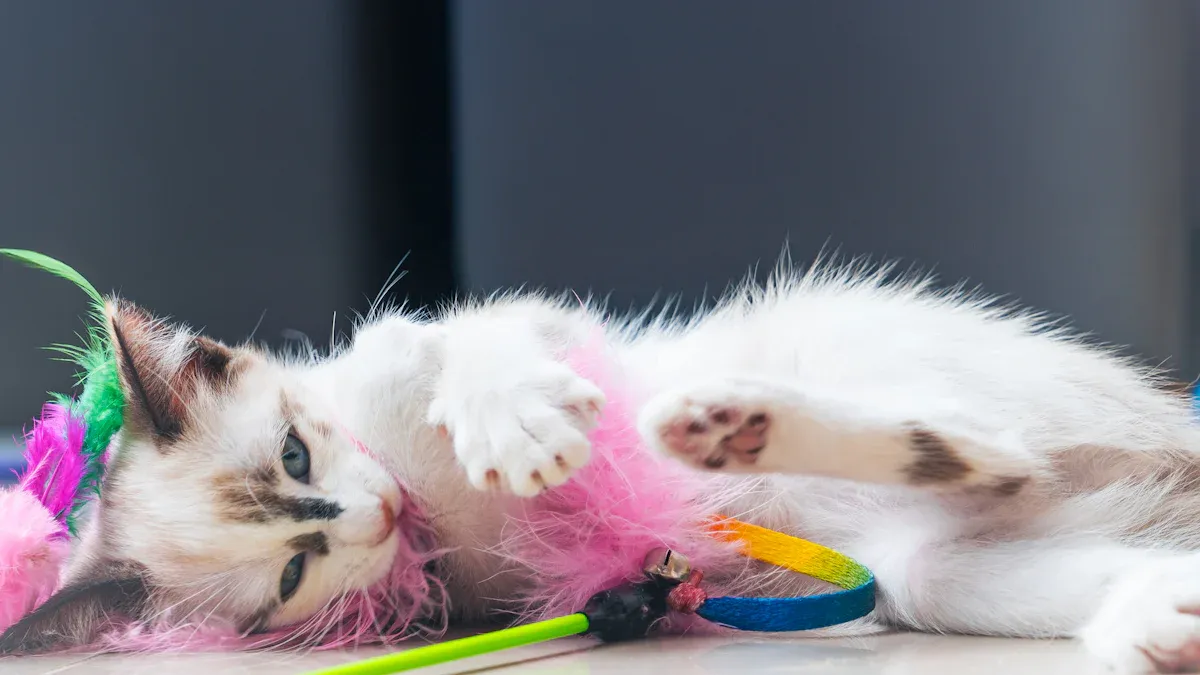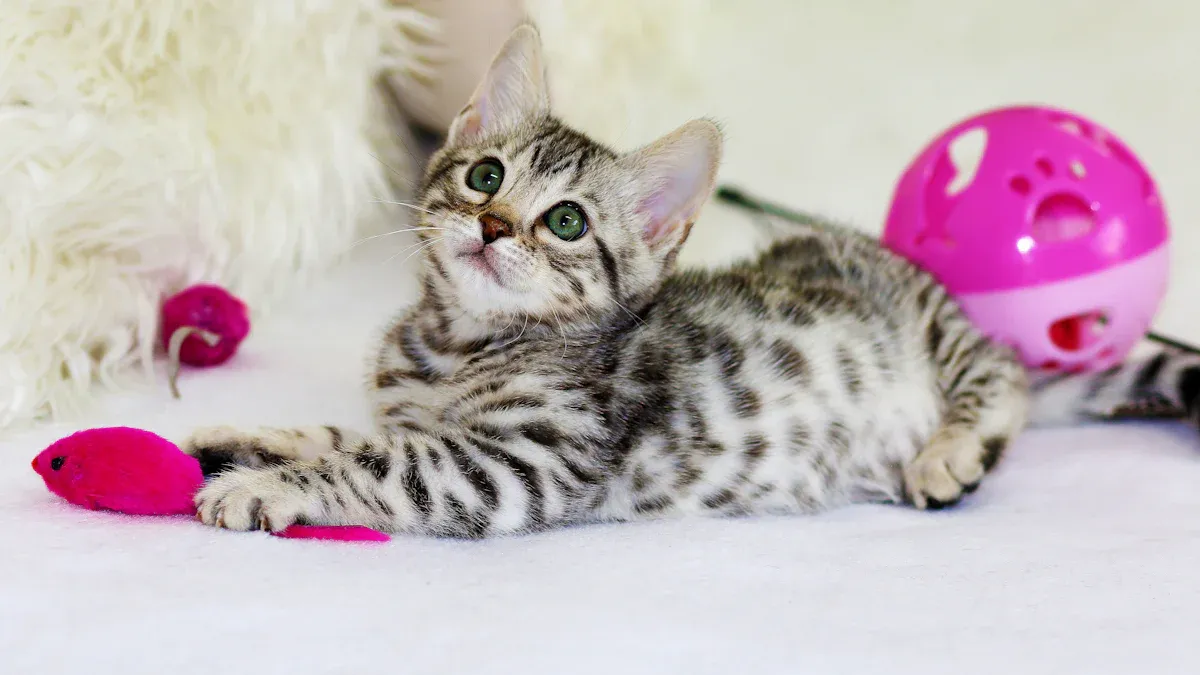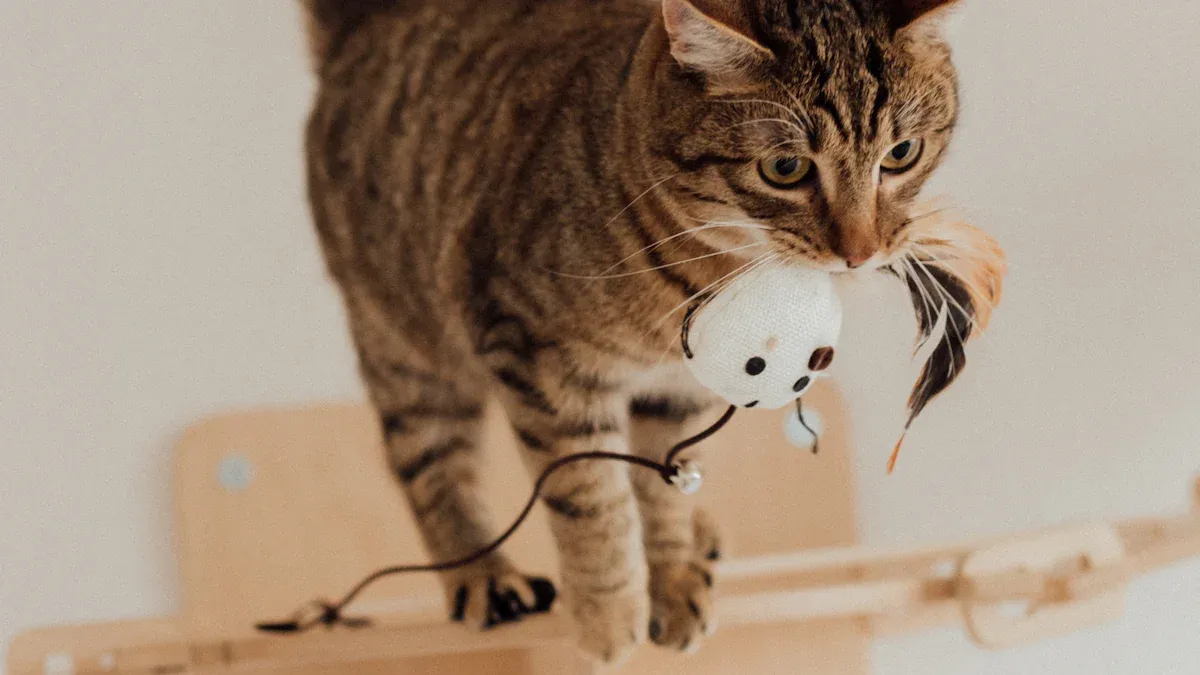Views: 0 Author: Site Editor Publish Time: 2025-07-13 Origin: Site










You want to make sure your kitten stays safe during play. Many kitten owners ask if a catnip ball toy is safe for young cats. Some worry about side effects like mild stomach upset or hyperactivity. Others wonder about the right age to introduce these toys or how to store them safely. Always pay attention to your kitten’s behavior and environment, and talk to your vet if you have concerns.
Catnip toys are safe for kittens when used in moderation and under supervision.
Kittens usually start reacting to catnip around six months old, but younger kittens can still play safely with these toys.
Choose catnip toys made from non-toxic, durable materials and replace damaged toys to prevent choking or injury.
Watch your kitten’s behavior during play to avoid overstimulation and stop play if your kitten shows signs of stress or allergy.
Limit catnip play sessions to once or twice a week and always supervise to keep your kitten happy and healthy.

You might wonder, is catnip safe for kittens? Many pet owners ask this question before introducing a catnip ball toy to their young cats. Catnip contains a natural compound called nepetalactone. This compound triggers playful or relaxed behavior in many cats. However, kittens under six months old usually do not react to nepetalactone. Their olfactory systems are still developing, so you may not see the classic rolling or rubbing behaviors until your kitten matures.
Veterinarians confirm that catnip is safe for kittens when used in moderation. Scientific studies show that catnip has a low toxicity level. Kittens can safely lick, chew, or play with catnip ball toys. Overconsumption might cause mild stomach upset, but most cats self-regulate their intake. You should always supervise your kitten during play to ensure a positive experience.
When choosing a catnip ball toy, you want to make sure it is made from non-toxic, durable materials. Many catnip ball toys use natural plant extracts like catnip or silvervine. Some toys include ABS plastic for strength. Others use organic fibers such as cotton or hemp. These materials are safe for kittens to lick and chew. High-quality, non-toxic materials also help promote dental health and reduce stress.
Tip: Always check the label for non-toxic certification and avoid toys with harmful chemicals.
Here are some common materials found in catnip ball toys:
100% natural plant extracts (catnip, silvervine)
Durable ABS plastic
Organic cotton or hemp fibers
Safe adhesives for sticking toys to surfaces
Experts recommend introducing catnip toys when your kitten is between three and six months old. Most kittens start to respond to catnip around six months, which is when their sense of smell matures. Younger kittens may not react, but they can still enjoy safe play with these toys. Always supervise playtime and inspect toys for damage.
| Aspect | Details |
|---|---|
| Minimum Recommended Age | Introduce catnip toys around 3-6 months; typical catnip response begins near 6 months. |
| Effect on Younger Kittens | Kittens under 3-6 months may not respond but can safely play with catnip toys. |
| Safety Recommendations | Supervise play to avoid overstimulation or injury; keep sessions short if kitten excitable. |
| Toy Quality | Use high-quality, durable catnip toys; discard damaged toys to prevent ingestion hazards. |
| Behavioral Notes | Some kittens may show little interest; others may become excitable or relaxed. Monitor reactions. |
If you want to choose recommended toys for your kitten, look for cat toys made from natural, non-toxic materials. This ensures your kitten can play safely and enjoy the benefits of catnip ball toys as they grow.

You might notice that not every kitten reacts the same way to catnip. The reason lies in genetics. Some cats inherit a special gene that makes them sensitive to the effects of catnip, while others do not. If your kitten has this gene, you may see playful behaviors like rolling, rubbing, or chasing after toys. Without the gene, your kitten may ignore catnip completely.
Catnip sensitivity is inherited.
About one third of cats lack the gene for catnip response.
Kittens under six months usually do not show strong effects, even if they have the gene.
Note: The effects of catnip include increased playfulness, excitement, or sometimes calmness. These effects are temporary and usually last about 10 to 15 minutes.
Veterinary studies show that most kittens begin to respond to catnip at around three months of age. Before this time, especially in kittens under six months, you will likely not see any reaction. The effects depend on both age and genetics. Research shows that about 30-50% of kittens do not react to catnip at all, even as they grow older. This non-response is normal and does not mean anything is wrong with your pet.
| Age Range | Typical Catnip Response |
|---|---|
| Under 3 months | Little to no response |
| 3-6 months | Some kittens start to respond |
| Over 6 months | Most genetically sensitive cats show effects |
If your kitten does not react, you can still offer catnip toys. Early exposure is usually not harmful, as long as the toys are safe. For those who do respond, catnip can provide both fun and relaxation. You may notice the benefits of catnip in the form of increased activity or stress relief during playtime.
Most kittens can enjoy catnip safely, but a small number may show signs of an allergy. You should watch for symptoms like skin irritation, excessive drooling, or stomach upset after your kitten plays with a catnip ball toy. Some kittens may also sneeze, cough, or develop itchy eyes and ears. These reactions are rare, but you need to act quickly if you notice them.
If your kitten shows any of these symptoms:
Stop using the toy right away.
Observe your kitten closely for changes in behavior or appearance.
Avoid giving catnip again if negative reactions occur.
Contact your veterinarian for advice, especially if symptoms persist.
Tip: Allergic reactions can include hair loss, inflamed skin, sneezing, or even gastrointestinal discomfort like vomiting or diarrhea. Your vet can help diagnose and treat allergies if they develop.
Kittens love to chew and bite their toys. Sometimes, they may swallow small pieces of the toy or large amounts of catnip. Ingesting a little catnip usually causes only mild stomach upset. However, eating toy parts can be dangerous.
Watch for these warning signs if you think your kitten has swallowed part of a toy:
Weakness or tiredness
Trouble standing or moving
Loss of bladder control
Shaking or trembling
Vomiting or diarrhea
Difficulty urinating or defecating
These symptoms may signal a blockage or a reaction to too much catnip. If you see any of these signs, call your veterinarian right away. Quick action can prevent serious health problems.
Note: Always inspect toys for damage before and after play. Replace any toy that shows signs of wear to keep your kitten safe.
Catnip can make some kittens very playful or excitable. The effects usually last about 10 to 15 minutes. Too much catnip or too much play can lead to overstimulation. Your kitten may become hyperactive, jumpy, or even a little aggressive. Some kittens may also feel stressed or anxious if they play for too long.
To prevent overstimulation:
Limit play sessions with catnip toys to short periods.
Watch your kitten’s behavior and stop play if they seem too excited or stressed.
Give your kitten time to rest between playtimes.
Callout: Regular breaks and supervision help your kitten enjoy the positive effects of catnip without becoming overwhelmed.
You should always supervise your kitten during play, especially when introducing a new catnip ball toy. Supervision helps you spot any unsafe behavior right away. Kittens love to chew, chase, and bat at their toys. Sometimes, they may try to bite off small pieces or get too rough. Watching your kitten lets you step in if the toy breaks or if your kitten starts to play-fight too aggressively.
Always watch kittens when they play with toys that have small parts.
Remove and throw away any toy that gets damaged.
Discourage rough play to prevent biting or scratching injuries.
Keep catnip toys out of reach when not in use to avoid unsupervised play.
Tip: Kittens under four to six months may not respond to catnip, so you can wait until they are older before offering these toys.
Regular toy maintenance keeps playtime safe and fun. Check your catnip ball toys often for signs of wear. Look for frayed fabric, broken seams, or loss of shape. If you notice any damage, replace the toy right away. This prevents choking or injury from broken pieces. Clean the toy as needed to keep it fresh and hygienic. The cleaning method depends on the material, so follow the manufacturer's guidelines.
Inspect toys before and after each play session.
Replace toys immediately if you see damage.
Clean toys regularly to maintain hygiene and the benefits of catnip.
Supervise play to catch any problems early.
Moderation is key when using catnip with kittens. Most kittens under six months do not react to catnip, so you can wait until they are older. When you start, use only a small amount—no more than a teaspoon of dried catnip at a time. Avoid giving catnip every day. Instead, offer it once or twice a week. This prevents overstimulation and helps your kitten stay interested in the toy. Watch your kitten for any signs of digestive upset, like vomiting or diarrhea. If you notice these symptoms, stop using catnip and talk to your veterinarian.
Note: Always follow the manufacturer's guidelines for catnip use and replenishment. Adjust the amount and frequency based on your kitten's behavior and health.
You want your kitten to play safely and happily. Always introduce catnip ball toys when your kitten is old enough and supervise playtime.
Choose toys made from safe, durable materials and avoid small parts that could be swallowed.
Watch your kitten’s reactions and adjust play sessions as needed.
Regular inspection and responsible use help prevent accidents and support healthy habits. With proper care, catnip ball toys can boost your kitten’s curiosity, mental sharpness, and joy during play.
Choosing a Skylark Source catnip toy means you’re not just buying a toy; you’re investing in your kitten’s happiness and well-being. You’re choosing a product that has been thoughtfully designed to provide a safe, stimulating, and enriching experience. When your kitten is finally ready for that magical catnip moment, you can rest easy knowing they are playing with a toy that is as safe as it is fun.
You can let kittens under six months play with catnip ball toys. Most kittens at this age do not react to catnip. Always supervise play and choose toys made from safe, durable materials.
You should offer a catnip ball toy once or twice a week. This keeps your kitten interested and prevents overstimulation. Watch your kitten’s behavior and adjust the frequency if needed.
Remove the toy right away. Watch your kitten for signs like vomiting, diarrhea, or trouble breathing. Contact your veterinarian if you notice any unusual symptoms.
Catnip ball toys can encourage positive play and help redirect unwanted behaviors. Use them as a reward during training sessions. This makes learning fun for your kitten.
Look for symptoms like itching, sneezing, or skin redness. If you see these signs, stop using the toy and talk to your veterinarian for advice.